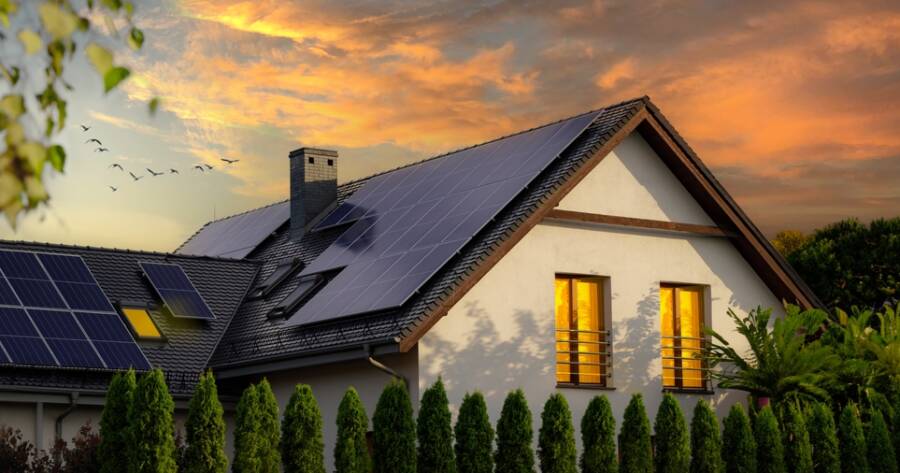As climate consciousness grows, more homeowners are choosing to harness the power of the sun. Residential solar systems offer a sustainable way to reduce energy bills and decrease carbon footprints. Understanding how solar panels work and their benefits can guide you towards adopting this eco-friendly solution. Whether you’re motivated by environmental concerns or seeking energy independence, exploring residential solar systems introduces a range of opportunities. Here, you can learn about the fundamentals of solar energy and its potential impact on your home.
What are Solar Panels?
Solar panels, composed of photovoltaic (PV) cells, convert sunlight into electricity, providing renewable energy for homes. These panels harness photons from sunlight, creating an electric field that generates direct current (DC) electricity. This electricity passes through an inverter, transforming it into alternating current (AC), which powers household appliances. Solar panels provide a clean and consistent energy source as long as they have adequate sun exposure.
The efficiency of solar panels varies based on material types and installation conditions. Silicon-based panels are commonly used due to their balance of efficiency and cost. Furthermore, the location of installation significantly influences performance; panels positioned on south-facing roofs with minimal shading tend to optimize energy output. Employing optimal placements maximizes the return on investment and aligns with residential energy needs.
Key Benefits of Solar Systems
Residential solar systems present multiple benefits beyond merely reducing electricity costs.
Environmental Impact
Utilizing solar energy substantially reduces reliance on fossil fuels, decreasing greenhouse gas emissions. Each kilowatt-hour of solar energy generated lessens conventional energy demand, contributing to lower air pollution. This clean energy alternative offers a poignant response to climate change, fostering sustainable living practices. Adopting solar technology reflects a commitment to environmental stewardship, creating a cleaner planet for future generations.
Financial Savings
Installing solar panels can lead to substantial financial savings by reducing monthly electricity bills. Over time, users may offset initial installation costs with lowered energy expenses, resulting in net savings. Additionally, various government incentives, tax credits, and rebates might further decrease investment costs. Exploring these financial options helps homeowners access solar technology while minimizing upfront expenditures.
Factors to Consider When Going Solar
Before transitioning to solar energy, several critical factors warrant consideration for optimal integration.
Evaluating Solar Potential
Homeowners should assess their property’s solar potential, considering roof orientation, shading, and regional climate. Engaging with a professional solar assessor can provide an accurate estimation of energy output and system requirements. This evaluation determines expected efficiency and informs informed decisions regarding installation viability. Addressing potential challenges at this stage ensures enhanced performance and efficiency post-installation.
Choosing Solar Panels
Selecting the appropriate type of solar panel is crucial for meeting household energy demands effectively. Considerations include material type, efficiency ratings, warranty periods, and aesthetic preferences. While monocrystalline panels offer high efficiency, polycrystalline panels present more cost-effective options. An informed analysis weighing factors such as efficiency and budget can guide homeowners towards suitable choices for their energy objectives.
Installation and Maintenance
Proper installation and maintenance are essential for maximizing the longevity and function of residential solar systems.
Installation Process
Professional solar installers offer expertise in navigating the technical and structural aspects of panel installation. They ensure panels are securely mounted, connect inverters correctly, and align other system components efficiently. Installation often requires coordination with local utilities and compliance with building codes, further highlighting the importance of professional involvement. Securing experienced installers contributes to safety, performance, and adherence to relevant standards.
Maintaining Solar Systems
Routine maintenance plays a key role in sustaining solar system efficiency over time. Essential maintenance tasks include cleaning panels to remove dust or debris and inspecting the system for damage. Regular professional inspections can identify performance issues and ensure optimal energy production. Diligent care promotes durability and continued savings, supporting long-term energy independence.
Cost Considerations and Financing
Understanding the costs associated with solar systems enables strategic financial planning and investment.
Initial Costs and Returns
The cost of solar installation depends on factors like system size, panel type, and local installation rates. Although an initial investment is required, many homeowners find the long-term savings an appealing benefit. Reducing electricity expenses and potential property value increases complement monetary incentives and tax credits. Calculating payback periods helps assess investment viability and anticipate future returns.
Exploring Financing Options
Numerous financing solutions exist to facilitate solar adoption, alleviating financial barriers. Solar loans, leasing arrangements, and power purchase agreements (PPAs) are common methods used to finance installations. Each option offers different benefits and trade-offs, requiring careful consideration before selection. Engaging with a financial advisor or a solar professional can help navigate these choices, leading to an optimal financing strategy tailored to individual circumstances.
Learn More Today
Embracing residential solar systems empowers homeowners to contribute to a sustainable future while enjoying financial and environmental benefits. Understanding the fundamentals of solar energy allows for informed decision-making, ensuring successful integration into everyday life. By considering essential factors such as system potential, installation practices, and cost frameworks, you equip yourself to harness the sun’s power effectively.
Explore solar options with confidence and join the movement towards cleaner, renewable energy. For in-depth exploration and personalized insights, connecting with solar experts can guide your transition, maximizing the enduring advantages of solar technology in your home.





